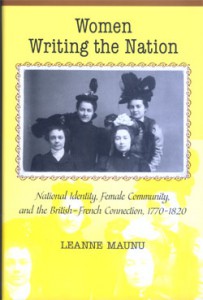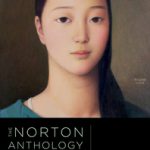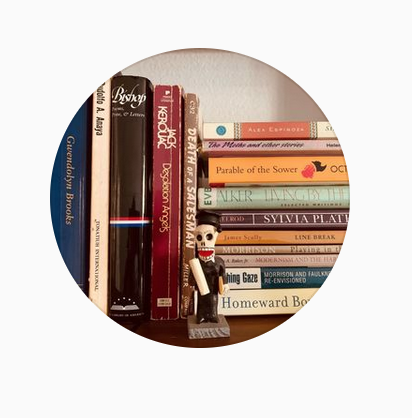I’ve been at Palomar College since the fall of 2002, when I was first hired on as a tenure-track English Professor — and I feel so fortunate to be at Palomar, where I have such wonderful students and colleagues!
My educational and teaching background:
I’m originally from San Diego, and graduated with my B.A. degree from the University of California at San Diego (UCSD) in English and American Literature, with cum laude honors from Revelle College and With Highest Distinction honors from the Department of Literature. My undergraduate Honor’s Thesis (which was on theories of education in the works of William Wordsworth, Mary Wollstonecraft, and Jean-Jacques Rousseau) won the Department of Literature’s Burckhardt Prize. I also studied Italian (both language and literature classes) for two years while at UCSD, and I have minors in French Literature and Political Science.
After graduating from UCSD, I received a French Government Fellowship (administered through the Fulbright program) that allowed me to spend a year teaching English conversation classes at a high school in France. Upon my return, I attended graduate school at Indiana University (IU), where I had received a Graduate School Fellowship. While at IU and during my second year of teaching, I won the William Riley Parker Prize, which is given out for outstanding teaching by a graduate student in her or his second or third year of teaching.
My Master’s and Ph.D. degrees are in English, and I have a Ph.D. minor in French. My area of specialty is late-eighteenth-century British literature and Romanticism, with a secondary interest in the French literature being written during this period, but I love literature from all time periods. My Ph.D. dissertation analyzes texts by Frances Burney, Charlotte Smith, and Mary Wollstonecraft, and, in 2007, it was published by Bucknell University Press as a book called Women Writing the Nation: National Identity, Female Community, and the British–French Connection, 1770-1820. I have also published articles on Mary Shelley, Frances Burney, and Charlotte Smith, and entries that I have written for the The Cambridge Guide to the Eighteenth-Century Novel are forthcoming.
At Palomar, I teach a variety of composition and literature courses in the English Department, and was a Finalist seven times for Palomar’s Distinguished Faculty Award (DFA) for Excellence in Teaching, before winning the award in Spring 2019. In Spring 2014, I was also the co-winner of Palomar’s Gift of Time award, which is given out by Palomar’s Faculty Senate for service to the college, for my four years of work as our faculty Professional Development Coordinator. I’m also a faculty co-advisor for our Palomar English Majors Group, and for the 2018-2020 academic years, I served as our English Department Writing Center Director. I’m currently serving as department chair.
My hobbies and interests:
In my free time, I love hanging out with husband, family, and friends; reading novels and non-fiction texts; experimenting in the kitchen with vegan baking and cooking; learning about health, nutrition, and fitness; and working out. I also love traveling, and some of my favorite cities and countries I’ve been to are Italy, France, England, Greece, Croatia, Amsterdam, Prague, Budapest, Istanbul, Stockholm, and Norway. My biggest hobby, though, is beading (you can see photos of my work here), and in 2016 and 2017, I served as the volunteer President of the San Diego Bead Society, a non-profit organization devoted to the art and craft of beading.
My research:
My research interests center around women writers, nationalism, British and French literature during the late-eighteenth century and Romantic periods, and theories of violence. More recently, I’ve developed an interest in the contemporary Gothic novel, and I spent my last sabbatical doing work in that area.
My book, Women Writing the Nation: National Identity, Female Community, and the British–French Connection, 1770-1820 , was published in 2007 by Bucknell University Press as part of their Bucknell Studies in Eighteenth-Century Literature and Culture series.
Women Writing the Nation engages in recent discussions of the development of British nationalism during the eighteenth century and Romantic period. I argue that women writers looked not to their national identity, but rather to their gender identity to make claims about the role of women within the British nation. Women writers wanted to make it seem as if they were writing as members of a fairly stable community, even if such a community was composed of many different women with many different beliefs. They appropriated the model of collectivity posed by the nation, mimicking a national imagined community. In essence, because British-French relations dominated the national imagination, women had to think about their own gender concerns in national terms as well.
My Publications:
- Academic advisor and co-author (solicited) for the entry on Mary Shelley’s novel Valperga for Gale/Cengage’s Nineteenth-Century Literature Criticism (NCLC) series, published by Layman Poupard Publishing. Co-author of “Critical Reception” section. 2020.
- Four entries for The Cambridge Guide to the Eighteenth-Century Novel, 1660-1820, Cambridge University Press, 2020.
- Madame de Genlis [trans. James Beresford], The Knights of the Swan; Or, The Court of Charlemagne: A Historical and Moral Tale: to serve as a continuation to the Tales of the Castle; and of which all the incidents that bear analogy to the French Revolution are taken from history. Translated from the French of Madame de Genlis, Author of The Theatre of Education, Adelaide & Theodore, &C. By the Rev. Mr. Beresford (1796)
- Anonymous, Constantia de Courcy . . . IMITATED FROM THE FRENCH (1806)
- Madame de Genlis, Jane of France: An Historical Novel (1816)
- Edward Castleton Giffard, France & England; Or, Scenes in Each (1815)
- “Review of L. Adam Mekler and Lucy Morrison, eds. Mary Shelley: Her Circle and Her Contemporaries.” Keats-Shelley Journal Volume LX (2011). Solicited book review. (Click here for a copy of my review.)
- “The Connecting Threads of War, Torture, and Pain in Mary Shelley’s Valperga.” European Romantic Review 21.4 (August 2010). Journal article. (Click here for a copy of my Valperga article.)
- Women Writing the Nation: National Identity, Female Community, and the British–French Connection, 1770-1820. The Bucknell Studies in Eighteenth-Century Literature and Culture series. Lewisburg, PA: Bucknell University Press, 2007. Book. (Click here for more information about my book.)
- “Home Is Where the Heart Is: National Identity and Expatriation in Charlotte Smith’s The Young Philosopher.” European Romantic Review 15.1 (March 2004): 51-71. Journal article.
- “Quelling the French Threat in Frances Burney’s Evelina.” Studies in Eighteenth-Century Culture 31 (2002): 99-125. Journal article.
My Conference Participation:
- “The Connecting Threads of War, Torture, and Pain in Mary Shelley’s Valperga.” North American Society for the Study of Romanticism (NASSR) Conference, Duke University, North Carolina, May 2009.
- Volunteer Chair, “Apocalypse, Violence, and Romance,” North American Society for the Study of Romanticism (NASSR) Conference, Duke University, North Carolina, May 2009.
- Co-Presenter, “Using Non-Fiction as a Critical Thinking Exercise,” Cal-PASS section, Strengthening Student Success Conference, San Jose, California, October 2007.
- “Violence and Female Community in Frances Burney’s Evelina and The Wanderer,” Special session of The Aphra Behn Society for Women in the Arts, American Society for Eighteenth-Century Studies (ASECS), Atlanta, Georgia, March 2007.
- Co-Presenter, “A Continuum of Critical Reading and Writing Skills Using ‘The Emperor’s New Clothes,’ Grades 6-College,” Cal-PASS section, Strengthening Student Success Conference, San Diego, California, October 2006.
- “Vindicating Nationalism: Using the French to Understand the British in Mary Wollstonecraft’s Nonfiction,” Eighteenth and Nineteenth Century British Women Writers Conference (BWWC), University of Louisiana at Lafayette, April 2005.
- Volunteer Chair, “Rethinking the Boundaries of Separate Spheres in Jane Austen” panel, Eighteenth and Nineteenth Century British Women Writers Conference (BWWC), University of Louisiana at Lafayette, April 2005.
- “National Identity and Expatriation in Charlotte Smith’s The Young Philosopher,” American Society for Eighteenth-Century Studies (ASECS), Las Vegas, Nevada, March 2005.
- “Women Writing the Nation: Nationalism and Female Community in Late Eighteenth-Century England,” American Society for Eighteenth-Century Studies (ASECS), U. S. Air Force Academy, April 2002.
- “The Captain and the Admiral: The Changing Face of Nationalism in Frances Burney’s Evelina and The Wanderer,” Eighteenth and Nineteenth Century British Women Writers Conference (BWWC), University of Kansas, March 2001.
- Volunteer Chair, “18th-Century Politics” panel, Eighteenth and Nineteenth Century British Women Writers Conference (BWWC), University of Kansas, March 2001.
- “The ‘Strange Itch to Colonize’: Incorporating Scotland into the Body Politic in Smollett’s Humphry Clinker,” Western Society for Eighteenth-Century Studies (WSECS), accepted for February 2001 conference, but unable to attend.
- “Nationalism and Excess in Frances Burney’s Evelina,” Western Society for Eighteenth-Century Studies (WSECS), University of Nevada, Las Vegas, February 2000.
- “‘Extensive Plans of Usefulness and Independence’: Gender and the Nation in the Works of Mary Wollstonecraft,” American Conference on Romanticism (ACR), Indiana University, Bloomington, November 1999.
- “‘All Our Principles, All We Owe to God’: National Identity, Gender, and the French Revolution in Charlotte Smith’s Desmond,” American Conference on Romanticism (ACR),University of California, Santa Barbara, October 1998.
- “Politics and Concealment in Helen Maria Williams’ Letters from France,” Fifth Annual National Graduate Student Conference in Romanticism, Indiana University, Bloomington, April 1998.
- “‘Qu’il est beau d’avoir une patrie’: Discourses of Nationalism in Rousseau’s Julie, ou la nouvelle Héloïse,” American Conference on Romanticism (ACR), University of Georgia, Athens, January 1998.
- Chair, Romantic Significations panel, American Conference on Romanticism (ACR), University of Georgia, Athens, January 1998.




